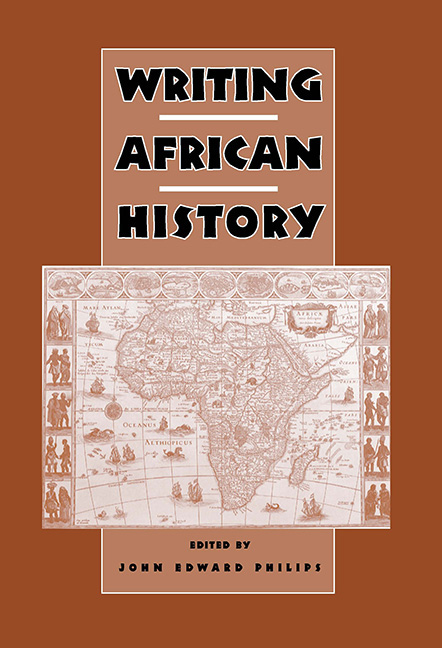Book contents
- Frontmatter
- Dedication
- Contents
- Acknowledgments
- Introduction
- Part I Background
- Part II Sources of Data
- 2 Archaeology and the Reconstruction of the African Past
- 3 Writing African History from Linguistic Evidence 86
- 4 Physical Anthropology and African History
- 5 The Importance of Botanical Data to Historical Research on Africa
- 6 Oral Tradition as a Means of Reconstructing the Past
- 7 Oral Sources and the Challenge of African History
- 8 Arabic Sources for African History
- 9 European Documents and African History
- 10 Mission and Colonial Documents
- Part III Perspectives on History
- Part IV Conclusion
- Contributors
- Index
- Miscellaneous Endmatter
3 - Writing African History from Linguistic Evidence 86
from Part II - Sources of Data
Published online by Cambridge University Press: 11 May 2017
- Frontmatter
- Dedication
- Contents
- Acknowledgments
- Introduction
- Part I Background
- Part II Sources of Data
- 2 Archaeology and the Reconstruction of the African Past
- 3 Writing African History from Linguistic Evidence 86
- 4 Physical Anthropology and African History
- 5 The Importance of Botanical Data to Historical Research on Africa
- 6 Oral Tradition as a Means of Reconstructing the Past
- 7 Oral Sources and the Challenge of African History
- 8 Arabic Sources for African History
- 9 European Documents and African History
- 10 Mission and Colonial Documents
- Part III Perspectives on History
- Part IV Conclusion
- Contributors
- Index
- Miscellaneous Endmatter
Summary
Historians of Africa, more than those of any other part of the world, have used linguistic evidence to enrich the contributions of their craft. They have made use of a basic linguistic characteristic, namely, that every language contains a wealth of potential information on the history of the people who have spoken it in the past. It remains only for historians to take even more advantage of that store of evidence.
What is meant by this claim of “wealth”? What data can a language provide for the writing of human history?
Every language is an archive of many thousands of individual artifacts of the past. These artifacts are the words of the language, hard evidence that can be rigorously placed into a linguistic stratigraphy. Each language contains the full range of vocabulary necessary to express all knowledge, experience, and cultural practice as pursued by the various members of the society using that language. As ideas, behaviors, and practices changed in the earlier history of that society, the vocabulary that described these features of culture also underwent changes: in the meanings applied to existing words, in the adoption or deriving of new words, in the loss or obsolescence of older words. The history of past change and development across the full range of culture and economy leaves its imprint on the histories of the thousands of individual words with which members of a society express all the various aspects of their lives.
The evidence of language history is a very democratic resource. Although it does not normally identify individual characters in history, it provides a powerful set of tools for probing the widest range of past developments within communities and societies as a whole, and it lends itself well to studies of history over the long term. For while linguistically based history may not allow precise dating, the data gained will relate directly to a whole array of cultural elements that comprise the longer-term trends and sustained courses of human development.
How are individual word histories uncovered in a language or group of languages? The essential first step is to establish what is often called a linguistic stratigraphy.
The most basic form of such a stratigraphy can be represented by a family tree of the relationships among the languages being studied.
- Type
- Chapter
- Information
- Writing African History , pp. 86 - 111Publisher: Boydell & BrewerPrint publication year: 2005



